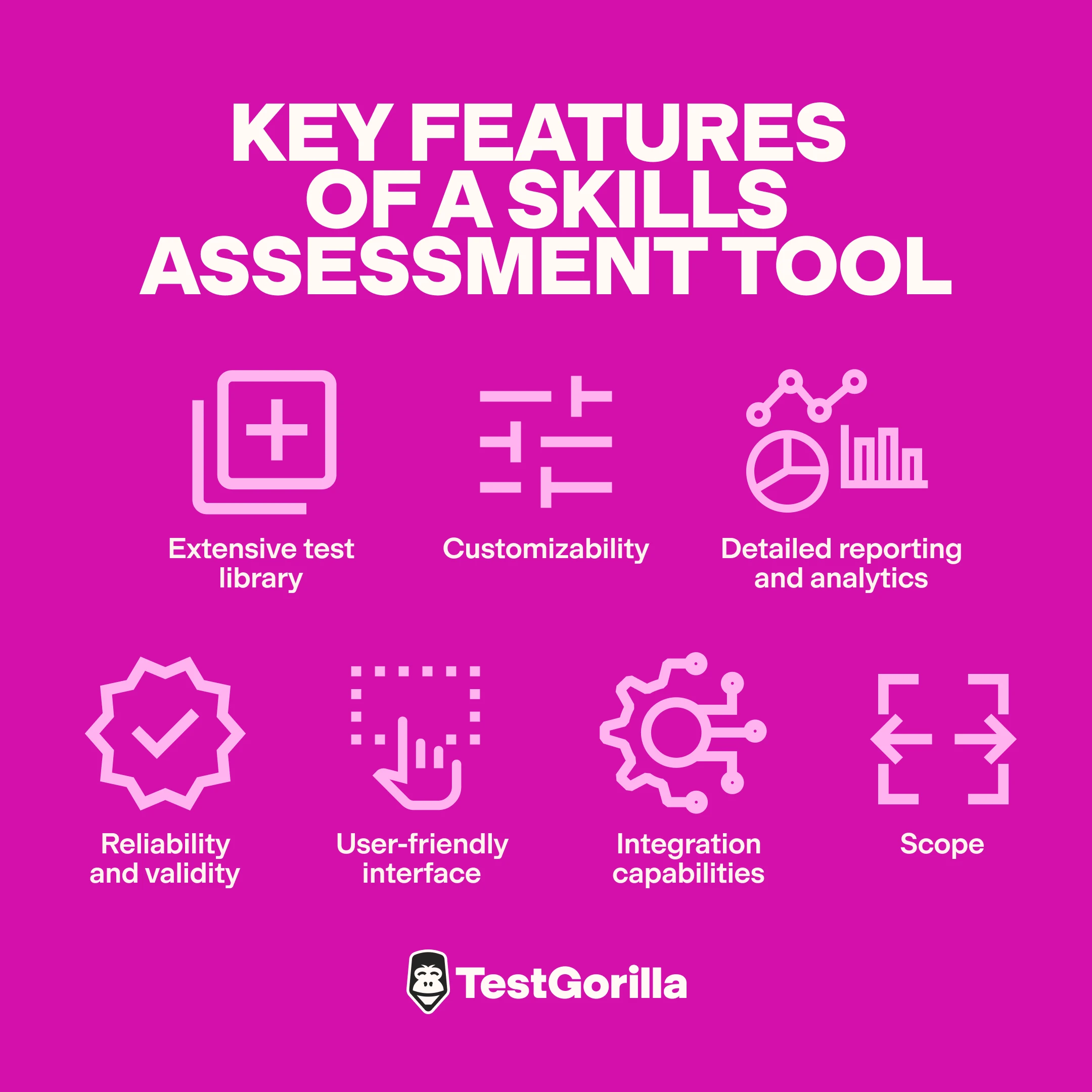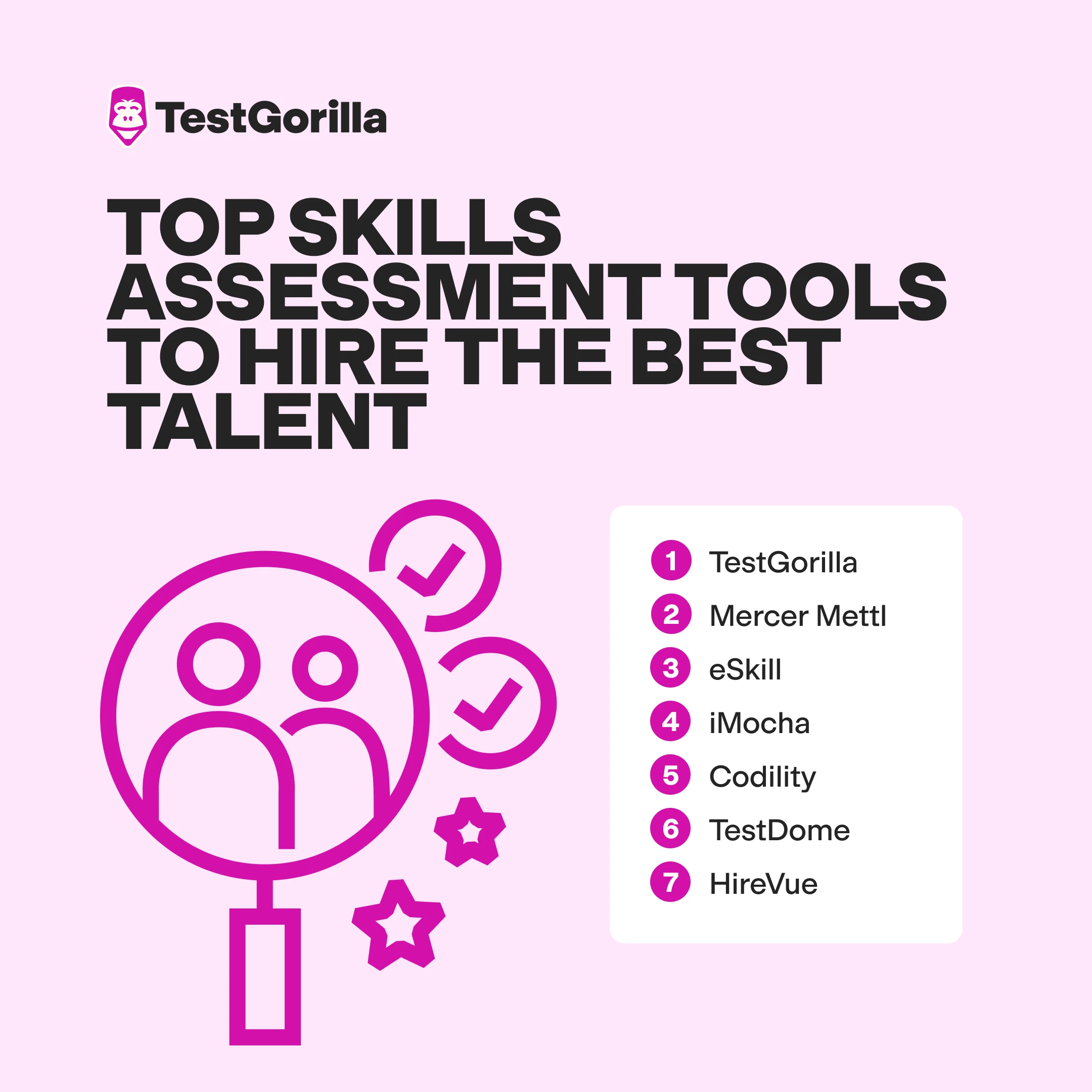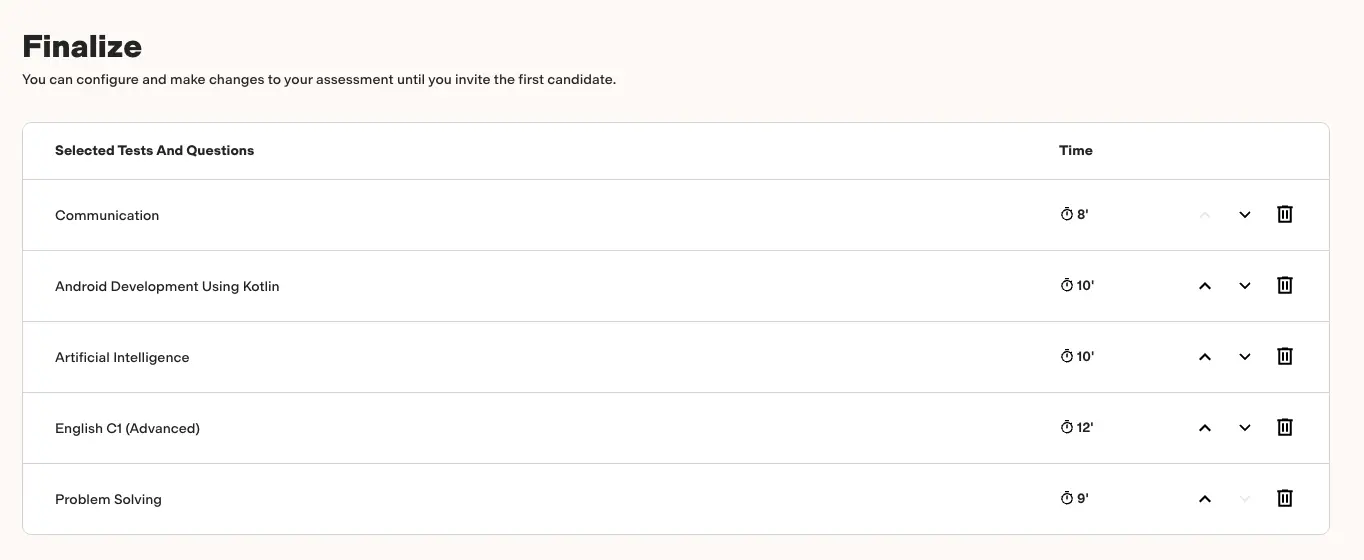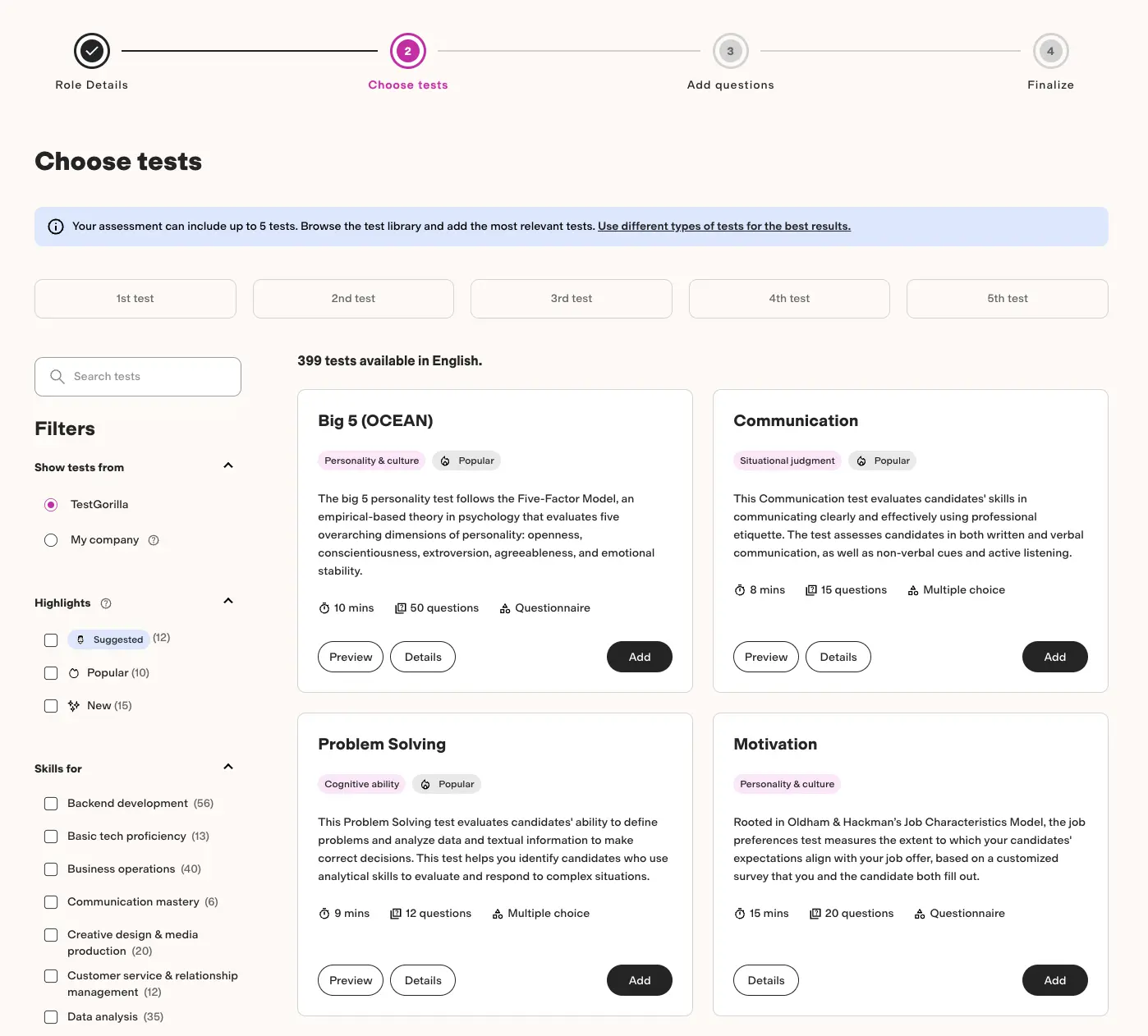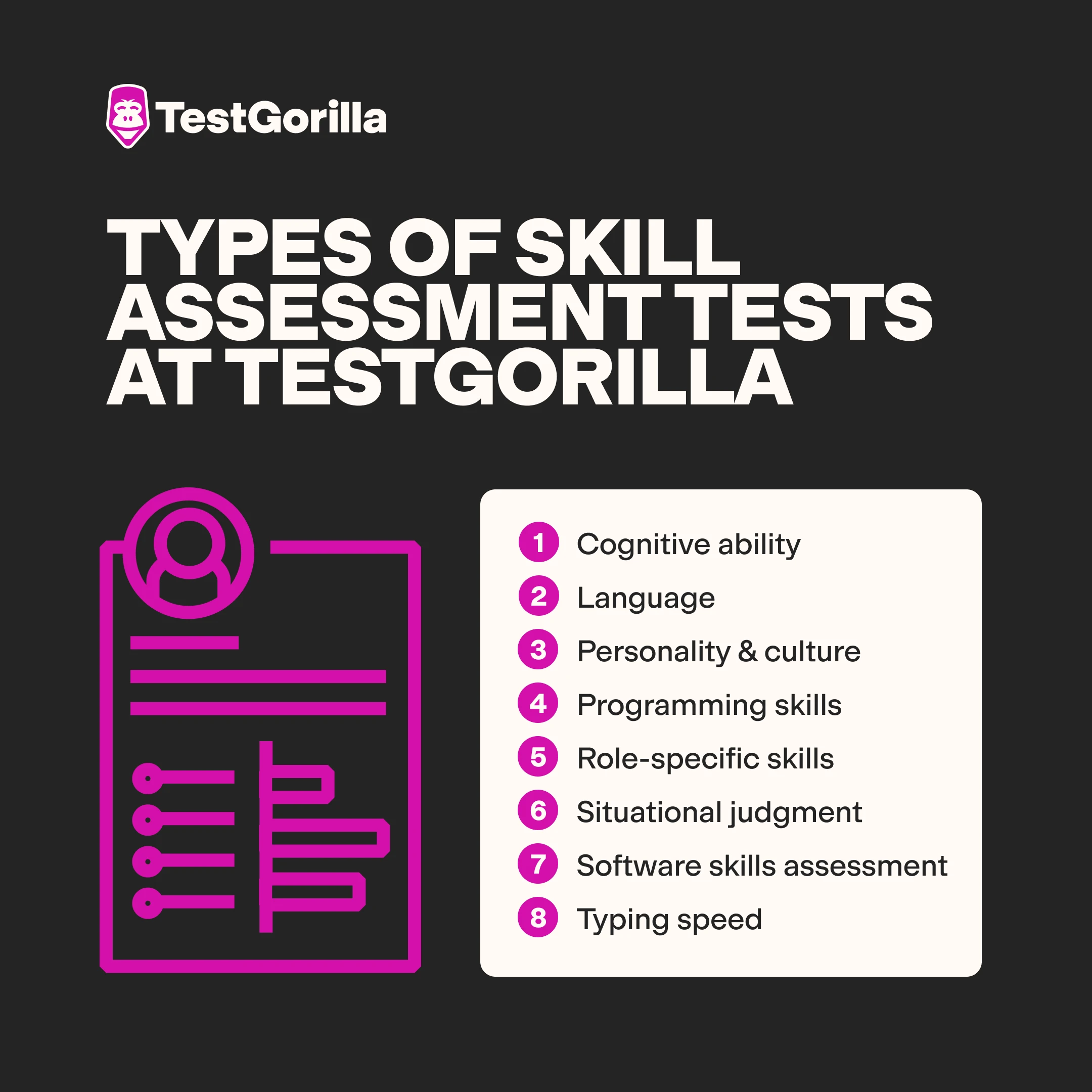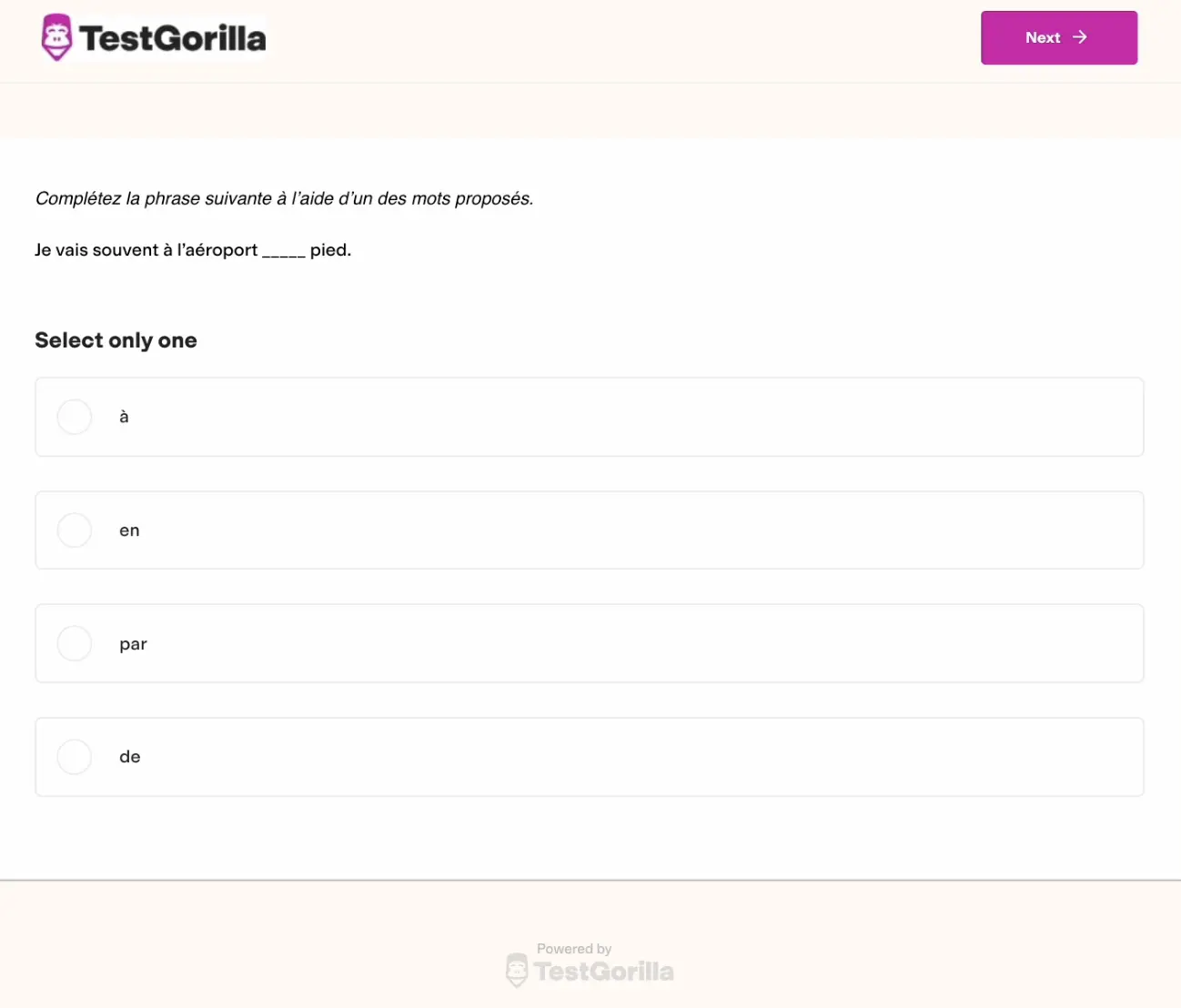Start hiring people based on skills, not resumes.
Take it from us – the best way to gauge a candidate’s talent is through objective skills testing, not resume screening.
Fortunately, there are lots of different skills-based assessment tools and software providers, each with its own methodologies and test types. But how do you narrow down what’s best for your hiring process?
We’re here to help – below, we explore the top seven skills assessment tools to help you start making more confident hiring decisions.
Table of contents
- The top 7 skills assessment tools at a glance
- What are skills assessment tools?
- Our evaluation criteria: What key features should you look for in a skills assessment tool?
- The 7 best skills assessment tools
- Our top pick: TestGorilla skill assessment tests
- Streamline your hiring process with skill assessment tools
- Frequently asked questions about skills assessment tools
The top 7 skills assessment tools at a glance
We researched and reviewed some of the top skills assessment tools for this guide – here’s a quick rundown of our top seven.
Name | Best for | Pricing |
TestGorilla | Companies of all sizes with broad skills testing needs | - Free (forever) plan from - Starter plan from $75 per month - Pro plan from $115 per month - Custom pricing plans for large enterprises |
Mercer Mettl | Companies looking to streamline hiring | Contact provider for details |
eSkill | Medium to large companies | Contact provider for details |
iMocha | Tech companies looking to hire at scale | Contact provider for a quote |
Codility | Technology companies looking to hire software developers and engineers | - Starter plan from $1,200 annually - Scale plan from $500 monthly |
TestDome | Companies that need to hire only a few candidates | Pay-per-candidate, from $7 to $20 per test-taker |
HireVue | Firms that need onboarding support | Contact provider for details |
What are skills assessment tools?
Skills assessment tools are software platforms designed to help you evaluate candidates’ skills during recruitment and training programs.
The best skill assessment tools offer a range of features, such as:
Ready-to-use skills tests
Customizable assessments
Asynchronous video interviews
Automated scoring and reporting
Anti-cheating measures
Looking for more detailed product insights?
Check out our comprehensive guide to compare the top talent assessment tools on the market.
Skills assessments give recruiters an objective alternative to resume screening. Resumes barely show you what applicants can do – they’re easy to fake, encourage hiring bias, and give misleading information.
For example, a candidate who mentions having many years of experience may be hiding the fact that they had little to no skill development during those years. Only a pre-employment assessment can put any questions regarding their competencies to rest.
In fact, our data shows 71% of employers agree that skills assessments are more predictive of on-the-job success than resumes.
The best insights on HR and recruitment, delivered to your inbox.
Biweekly updates. No spam. Unsubscribe any time.
Our evaluation criteria: What key features should you look for in a skills assessment tool?
When choosing a skills assessment tool, it’s important to assess each platform in depth to make an informed decision. Up to 83% of HR leaders claim that using the wrong technology is one of their biggest recruitment challenges.
With that in mind, here are the most important features to consider:
Extensive test library: Look for a wide range of tests, including cognitive ability tests, role-specific skills evaluations, psychometric tests, soft skills assessments, and language proficiency tests
Customizability: Prioritize test customization so you can tailor each assessment to match your needs
Detailed reporting and analytics: Pick a tool with in-depth analytics and reports to help you compare candidates’ strengths and weaknesses
Reliability and validity: Ensure that the tests are scientifically validated and reliable – they should consistently produce accurate results
User-friendly interface: Pick a skills assessment tool that’s easy to navigate for both hiring teams and candidates
Integration capabilities: Find a tool to easily integrate into your HR tech stack to streamline your workflows.
Scope: Choose a skills assessment tool that supports your ongoing talent management, learning and development, and succession planning initiatives
The 7 best skills assessment tools
Let’s break down our top seven skills assessment tools and see what each offers.
1. TestGorilla
TestGorilla is a talent discovery platform that helps you evaluate your applicants’ skill sets quickly, accurately, and objectively, thus reducing your time to hire and eliminating unconscious bias.
With our platform, you can build skills assessments of up to five skills tests from a library of more than 400 tests (and always growing!).
With this, you gain a 360-degree view of each candidate and can compare your talent to see who has the right skills to best meet your hiring needs.
On our platform, you can either create your own assessments or use our ready-made tests from our library.
When creating a test, you can define the questions yourself and ask candidates to provide a video response, write a long or short answer, or upload a file. The only constraint to using custom-made questions is that you need to manually grade their scores.
Most skill assessment tests take around ten minutes to complete, so a full skills assessment takes less than an hour.
With TestGorilla, you don’t need to engage in lengthy resume screening. Instead, you gain an objective and accurate idea of each candidate’s skill levels through our simple validation system.
You can even screen thousands of applicants simultaneously with volume hiring and comparison, saving you much more recruitment time.
Pros:
A large test library of 400+ skills tests
Asynchronous video interviews
Fully customizable assessments
Strong anti-cheating measures
Cons:
No one-on-one video interviews
Free version: Yes, we offer a Free forever plan with five skills tests
Pricing:
Free forever plan
Starter plan, from $75 per month (charged annually)
Pro plan, from $115 per month (charged annually)
Custom pricing for larger enterprises
Best for: Companies of any size with broad skills testing needs
Our verdict: With its 400 skills tests and counting, TestGorilla is the best choice if you need to hire for a range of roles and skills, no matter how technical.
What’s more, we’re constantly upgrading our platform and improving our tests to provide you with the best hiring experience.
Take a tour of our skills testing platform
Want to see how TestGorilla works in practice? Book a free 40-minute demo with our team and let us give you a tour.
2. Mercer Mettl
Mercer Mettl is an online talent assessment company that offers a suite of tools for talent acquisition and development.
Its scalable skills assessment software offers a range of online skills assessments to help employers evaluate applicants’ core traits and acquired skills.
The platform helps you to create customized assessments and assess candidates’ abilities and decision-making skills in real time.
There’s also an auto-proctoring suite to minimize the risk of applicants cheating.
On the downside, Mercer Mettl only lets you test up to 25 skills at the time of writing. The company is also evasive on pricing until you contact its team. If you’re not a big fan of that, you can explore the top Mettl alternatives.
Pros:
A wide range of tests that help reduce bias
Proctoring features to limit cheating
Mobile-friendly
Cons:
Fewer skills tested than some competing platforms
Free version: No, but a free trial is available
Pricing: No pricing details on the website
Best for: Companies looking to streamline hiring
Our verdict: Mercer Mettl is a robust platform that offers a wide range of skills tests for soft and technical abilities. Thanks to its strong proctoring measures, it’s also a good choice for educational institutions.
3. eSkill
eSkill is an online skills assessment tool that offers customizable tests to evaluate candidates' suitability for various job roles.
The platform is highly flexible, with hundreds of specialized tests and advanced simulation options for specific software and in-depth scenarios.
The sheer number of options is impressive and may even be overwhelming, but eSkill doesn’t necessarily have the same variety of test types that some competitors do.
The platform can be used in different industries, including IT, healthcare, education, and customer service. It also offers integrations with popular applicant tracking systems (ATS).
Pros:
Customizable tests you can adapt to your roles
Integrations with the most popular ATS tools
Easy to use for test-takers and employers
Cons:
No free version
Pricing information isn’t available on the website
Free version: No
Pricing: Not publicly available
Best for: Medium to large companies
Our verdict: eSkill features an impressive array of skills tests, but its lack of a free version makes it inaccessible for small teams that need to test out a few platforms or have limited hiring needs.
4. iMocha
iMocha is an AI-powered skill assessment tool for screening talent, benchmarking employee skills, and performing skills gap analysis. It largely specializes in tech skills.
It has AI skills inference and matching features, an extensive test library, and plenty of detailed analytics.
The iMocha platform helps users to create customizable skill assessment tests. It also integrates well with popular HR tools.
What’s great about iMocha is its intensive insights – there’s plenty of data you can break down and use. However, some users might find this difficult to navigate at first.
Pros:
Large test library and customizable tests
AI-enabled features like coding interviews
Strong analytics and reporting capabilities
Cons:
Its learning curve is somewhat steep
No pricing information available on the website
Free version: No
Pricing: Custom pricing
Best for: Tech companies looking to hire at scale
Our verdict: iMocha is a good choice for companies looking to recruit for tech roles, but it might be of limited use for others.
5. Codility
Codility is an online platform that focuses on testing programming and coding skills, making it a great tool for technical recruitment.
It offers timed coding tasks and algorithmic challenges designed to mimic real-life development scenarios.
You can also use Codility to screen large volumes of candidates, making it a good choice for tech companies looking to scale rapidly. Non-technical recruiters, however, might need more time to figure out the platform’s features.
Pros:
Extensive coding test library
Live coding interview tool
Customizable coding tests
Cons:
Limited to technical roles; not suitable for non-technical positions
Steep learning curve for non-technical recruiters
Free version: No
Pricing:
Starter plan, from $1,200 annually
Scale plan, from $500 monthly
Best for: Technology companies looking to hire software developers and engineers
Our verdict: Codility is a good choice for companies looking to hire front- and back-end developers, QA testers, and software architects, but not so much for non-technical roles.
6. TestDome
With TestDome, employers can choose from premade skill assessment tests or create their own custom questions. Applicants complete self-assessments on their own devices using a link.
This skill assessment software offers anti-cheating measures like copy-paste disabling and webcam proctoring. Its reports about each candidate include information about how long an answer took to write and how the candidate did overall.
However, this platform doesn’t offer a free plan, and unlike many competitors, you pay per candidate. This isn’t an ideal model for larger companies looking to keep hiring costs low, which is why you should consider TestDome alternatives.
Pros:
More than 150 tests
You can create skills assessment test questions or use preset tests
Cons:
No free plan
Pay-per-candidate pricing can get expensive
Free version: No
Pricing:
Starter plan, at $20 per candidate
Small plan, at $16 per applicant
Medium plan, at $10 per test-taker
Large plan, at $8 per applicant
Extra large plan, at $7 per candidate
Best for: Companies that need to hire only a few candidates
Our verdict: TestDome has a test library of more than 150 tests and offers customization options so hiring managers can make their own test questions, though its scope is limited. For small businesses looking to hire just a few people, the per-candidate pricing can be affordable.
7. HireVue
HireVue is a candidate assessment platform that has both traditional and AI-powered assessments. It also offers video interviews and AI-powered text recruiting services.
The software helps companies hire technical professionals, like developers and software engineers, and non-technical professionals, such as customer service personnel and sales agents.
On top of this, the tool offers training and onboarding tours for new users, one-way video interviews, and interactive, gamified assessments. However, its test customization is limited with little variety of question types, which is why you might want to explore HireVue competitors.
Free version: No
Pros:
Has interview guides
Great for hiring a range of technical and non-technical candidates
Offers helpful AI chatbots to qualify and match candidates to roles
Cons:
Limited quality control measures compared with some rivals
No free plan for small businesses
Pricing: Contact the provider for details
Best for: Firms that need onboarding support
Verdict:
HireVue helps you to evaluate candidates through video interviews, online assessments, and AI-powered texts. However, it has limited customization compared with the broader market.
Our top pick: TestGorilla skill assessment tests
Pound-for-pound, we’ve made sure that TestGorilla is the best skills assessment tool out there. The quality and variety of our tests back this up.
We use questions which:
Are clear and easy to understand
Are up-to-date and reflect any recent developments in the area or subject
Provide enough information to give an accurate answer
Cover each subject in sufficient and accurate depth
Here are some examples of test types we offer:
Cognitive ability tests
Studies show that cognitive ability is a huge indicator of job performance. Our cognitive ability tests help you assess your candidates’ analytical and reasoning skills, such as:
Attention to detail
Critical thinking
Problem solving
Verbal reasoning
When combined, they give you a clearer picture of your applicants’ ability to understand and perform complex tasks.
For example, here’s a question someone might face in our Critical Thinking test:
Check out the Critical Thinking preview test for more example questions.
Language tests
We have more than 30 language tests to help you assess your candidates’:
Reading and listening comprehension
Grammar
Sentence composition and vocabulary
Here’s a typical question you can ask applicants in our French B1 (Intermediate) test:
Personality and culture tests
Assessments such as our Culture Add test help you hire a supportive, collaborative, and innovative workforce.
Beyond that, personality assessments help you find the right people for your team based on personality traits such as openness, extraversion, and emotional stability.
Programming skills tests
Hiring programmers can be difficult unless you’re using skills tests that are up-to-date on the latest coding development and use cases. That’s where TestGorilla comes in.
Our programming skills tests help you compare applicants’ skills in different programming languages and frameworks. For example, you can test for entry-level algorithms in JavaScript, React, and Flutter.
Role-specific skills tests
Role-specific skills tests evaluate your candidates’ ability to do the specific job you’re hiring for, and give you insight into your applicants’ performance – you can compare results side-by-side.
Ideally, you can combine them with cognitive ability or personality tests to get a good overall picture of each candidate’s strengths and weaknesses.
Situational judgment tests
Our situational judgment tests help you assess candidates’ capacity to navigate complex business situations and environments.
They cover areas like negotiation, leadership, people management, communication, and time management.
Here’s an example of a question you can ask to measure the latter:
Feel free to check out some preview questions from our negotiation skills assessment test, too.
Software skills assessment tests
Running a software skills assessment helps you assess your candidates’ ability to use the programs and tools needed in the role you’re hiring for.
Examples of software skills you can test for with TestGorilla include Google Analytics, Microsoft Azure, Zendesk CS, and Microsoft Word.
Typing speed tests
In fast-paced environments, typing speed can make a big difference in a person’s productivity and even in their ability to complete the work.
We have four typing speed tests you can use to evaluate your applicants’ typing speed, including a Lowercase-only test and a Capitalization and Punctuation test.
Build a multi-measure assessment
You can’t hire a well-rounded candidate on one skills test alone. That’s why, through TestGorilla, we help you run five skills at once as part of a multi-measure assessment.
That means you can easily assess personality, soft skills, and technical aptitude one after another.
On that note, you should never overlook soft skills in favor of technical aptitude alone. Around 84% of managers and employees believe skills such as communication are important to measure during hiring.
Therefore, we’ve made it easy for you to register for free and to start exploring our system.
Here’s an example assessment for a Java developer, which includes a balanced selection of soft and technical skills:
Here’s what we recommend for a customer service agent:
With these assessments, TestGorilla helps HR teams improve the quality of hire and recruitment ROI for companies worldwide.
Take MedX, for example. Since making our skills testing tool part of its hiring stack, HR managers at the medical billing firm now feel more confident and empowered to bring genuinely talented candidates on board.
Follow MedX’s lead and implement skills based hiring
Start testing employees’ skills 100% free today to make data-driven hiring, promotion, and training decisions.
Streamline your hiring process with skill assessment tools
Skills assessment tools help you to make skills-based hiring decisions that are accurate, objective, and unbiased.
We want to make sure our clients can pick the best candidate each time and have an accurate estimation of their future performance and chances of success.
That’s why we’ve developed a skills assessment tool that makes it easy to make data-driven, unbiased hires.
Sign up for our Free forever plan and see how we can help you make your hiring decisions faster, easier, and bias-free – or register for a free demo to talk to one of our experts.
Frequently asked questions about skills assessment tools
Still have questions? Read on for answers to the most common queries about skill assessment tools.
What are examples of skills assessment tools?
Some examples of skill assessment tools are TestGorilla, Mercer Mettl, eSkill, iMocha, Codility, TestDome, and HireVue. You can read our in-depth reviews of all these tools.
Remember, not every tool is right for every situation. Make sure you choose a tool that works well for your business and offers all the features you need.
What can you test with online skills assessments?
You can test any relevant workplace skills with online skills assessments. That might include hard skills like writing, data entry, coding, or language ability. It could also include soft skills like communication, leadership, or teamwork.
The right online skills assessment tool offers a wide range of skills tests and the means to build a custom assessment from multiple relevant tests.
What are the benefits of online skills assessment tools?
Skill assessment tools filter out anyone without suitable ability, personality, and knowledge for your role
Online assessments focus on predefined skills, traits, and qualities, offering an unbiased view of each candidate and what they can bring to your organization
Assessment tools enable you to assess a large pool of candidates, safe in the knowledge that only the best will require an interview
How do you conduct a skills assessment?
Determine what your goals are in conducting the skills assessment
Identify the skills you want to evaluate and use skills assessment tools to construct an appropriate test
Use the data you gain from the assessment to make progress toward your goals, whether they involve hiring a candidate or offering targeted training to existing employees
You've scrolled this far
Why not try TestGorilla for free, and see what happens when you put skills first.




